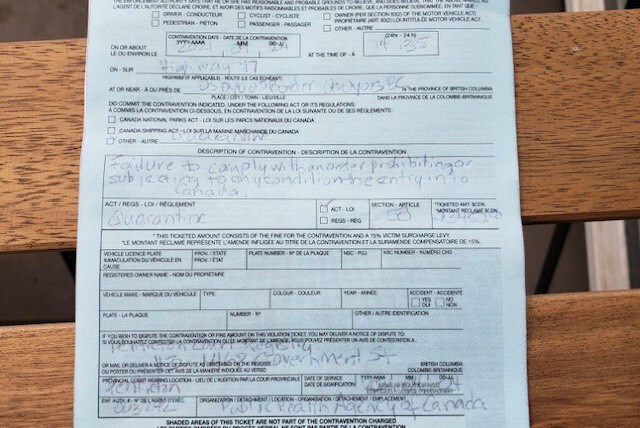A Kelowna man with dual U.S./Canadian citizenship was slapped with a penalty of nearly $3,500 after crossing the border to get vaccinated for COVID-19.
The man, who Castanet is identifying as ‘David’ to protect his employment, is a First Nations man who received his first dose of the COVID-19 vaccine on March 23 through the Westbank First Nation.
With vaccine supply extremely tight in Canada, and a glut of it south of the border, David called across the line and was invited in by several pharmacies. He was also encouraged to make the trip by cross-border vaccine clinics recently hosted by Montana’s Blackfeet Nation.
“We are running low and there are no vaccines here, so I thought I was helping everybody, the public good, in getting vaccinated,” David said.
Crossing into the United States at Oroville, Washington, border agents welcomed him through as a dual national. But when he tried to return to Canada, David says staff with Health Canada stationed at the border were not impressed.
“They were just really mean, saying, ‘How stupid are you?’” he said. "First off she said, ‘Oh, it’s great you got vaccinated.’ But here is your ticket.”
With the land border between the U.S. and Canada closed for non-essential travel, those driving across the border must show proof of a negative COVID-19 test taken within 72 hours of arrival.
David’s failure to arrive with a negative test — because he drove straight to the pharmacy and directly back to the border — resulted in him being issued a ticket for $3,450 under section 58 of the federal Quarantine Act.
With the COVID-19 vaccine available to anyone over the age of 16 in the United States, David can’t understand why Canada wouldn’t be encouraging its dual citizens to get vaccinated south of the border.
“If Ottawa is going to make us wait, four to eight months, why should we not be able to go get vaccinated across the border?” he asked.
As a First Nations man, David also believes he should have greater rights to cross the border freely, particularly for a reason like getting a vaccination, noting that the Syilx people live on both sides of the border.
“It is one people,” he said, adding that the First Nations’ territories predate the land border by thousands of years.
There is some legal precedent for that standpoint, at least in the U.S. The United States currently allows Canadian First Nations, with at least 50 per cent blood quantum, to enter the country freely for a wide variety of reasons under the 1794 Jay Treaty between the U.S. and Great Britain.
Canada, however, has not legally recognized the treaty since the War of 1812, something that has been upheld several times by the courts. There has been some work at the federal level to examine granting similar rights to First Nations people at the Canadian border, but nothing substantive.



